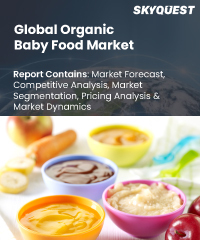
Product ID: SQMIG30I2146

Report ID:
SQMIG30I2146 |
Region:
Global |
Published Date: February, 2024
Pages:
242
|
Tables:
64 |
Figures:
77
Global Organic Baby Food Market size was valued at USD 3.53 billion in 2021 and is poised to grow from USD 3.82 billion in 2022 to USD 7.39 billion by 2030, growing at a CAGR of 8.7% in the forecast period (2023-2030).
Pesticides, growth hormones, antibiotics, and other potentially dangerous substances are not used in the production of organic baby food. It consists of dry fruit powder, sprouting porridge mixes, soups, juices, multigrain cereals, and milk powder. It supports the brain development and general growth of infants by being enriched with naturally occurring nutrients. It aids in lowering the likelihood of attention deficit disorder (ADD) and other issues involving concentration. As demand for organic baby food products like milk formulae and cereals rises, this sector is steadily expanding. In the upcoming years, it is anticipated that demand for these commodities would rise. For instance, in 2021 Neptune Wellness Solutions purchased a 50.1% stake in the plant-based infant food producer Sprout Foods. The transaction consists of a cash payment of USD 6 million and the issuance of about 6.7 million Neptune common shares, each worth USD 12 million. The business reported net revenues of USD 28 million annually. According to China customs data, the overall import of new born milk powder between January and March 2021 was close to 4,30,000 metric tonnes, a 5.4% decrease. High-end infant formula series, including Organic Zhizhi, from Feihe saw sales growth of 16.99% (Y-o-Y) in 2021 as a result of the rising sales of infant food products in China via Mum-and-Baby-food Store's for special medical uses. Sales of its normal equivalent, on the other hand, decreased by 25.94%. The industry is being driven by consumer knowledge of the advantages of organic products and the need to reduce the exposure of infants to the hazardous chemicals used in traditional food manufacturing. The growth of the prepared organic baby food market, one of the key expanding categories, was also significantly influenced by the increase in the number of working women globally.
Our industry expert will work with you to provide you with customized data in a short amount of time.
REQUEST FREE CUSTOMIZATIONWant to customize this report? This report can be personalized according to your needs. Our analysts and industry experts will work directly with you to understand your requirements and provide you with customized data in a short amount of time. We offer $1000 worth of FREE customization at the time of purchase.

Product ID: SQMIG30I2146